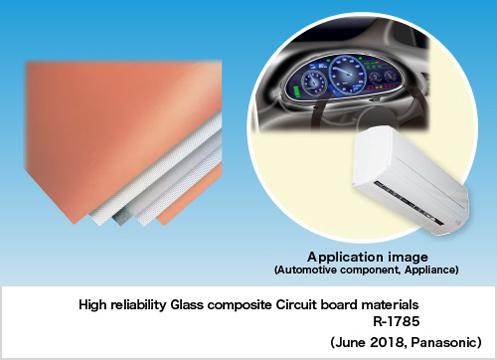www.magazine-industry-usa.com
05
'18
Written on Modified on
Panasonic Develops Glass Composite Circuit Board Material that Improves Parts Mounting Reliability
Panasonic's new glass composite circuit board material improves the mounting reliability of electronic circuit board parts, thereby contributing to the long-term stable operation of automotive and industrial equipment.

With the ever-increasing use of electronics in vehicles and recent trend toward high functionality of various industrial equipment, electronic circuit boards now require excellent parts mountability and compatibility with high currents. Panasonic has developed a glass composite circuit board material (CEM-3 grade) that achieves the industry's lowest*1 coefficient of thermal expansion (CTE) [1] by using its unique manufacturing method and resin design technology, thereby contributing to the improvement of parts mounting reliability and compatibility with high currents for electronic circuit boards.
Panasonic's new glass composite circuit board material has the following features:
The industry's lowest*1 coefficient of thermal expansion that improves the parts mounting reliability of electronic circuit boards
Coefficient of thermal expansion 15 – 17 ppm/°C (α1) (Board thickness: 0.8 mm)
Panasonic's conventional product*2: 20 – 23 ppm/°C (α1) (Board thickness: 0.8mm)
Excellent tracking resistance [2] compatible with the miniaturization of high-current circuit boards
Comparative tracking index (CTI) ≥ 600 V
Panasonic's conventional product*3: 250 V > CTI ≥ 175 V
Highly accurate board thickness that contributes to the stable operation of electronic circuit boards
Board thickness accuracy: ±0.05 mm (Board thickness: 1.6 mm)
Panasonic's conventional product*3: ±0.10 mm (Board thickness: 1.6 mm)
(Twice the accuracy)
Product Features
The industry's lowest coefficient of thermal expansion that improves the parts mounting reliability of electronic circuit boards
Lead-free solder, which has been more commonly adopted for parts mounting in recent years, requires circuit board materials with high mounting reliability because its bonding strength is lower than that of conventional lead-containing solder. Although glass composite circuit board materials are superior to the current mainstream glass epoxy circuit board materials in terms of processability and cost performance, they have issues with mounting reliability due to their high thermal expansion. This new product has achieved the industry's lowest CTE as a glass composite circuit board material thanks to Panasonic's unique resin design technology. It has high parts mounting reliability and contributes to improving the reliability of electronic circuit boards during long-term use.
Excellent tracking resistance compatible with the miniaturization of large current circuit boards
With the increasingly more compact and lightweight power supply circuit boards due to the recent trend toward high functionality of various equipment, electronic circuit board wiring is becoming increasingly more narrow-pitch, requiring the improvement of insulation properties between circuits. The current mainstream glass epoxy circuit board materials have issues with improving tracking resistance, which is an indicator of intercircuit insulation properties. This new product has achieved the industry's highest tracking resistance grade, PLC = 0 (600 V or higher), thanks to Panasonic's unique resin design technology, thereby achieving high intercircuit insulation properties. The product enables the design of ever more finely wired electronic circuit boards, thereby contributing to compatibility with high currents and the miniaturization of circuit boards.
Highly accurate board thickness that contributes to the stable operation of electronic circuit boards Impedance, which is an important characteristic of electronic circuit board designs, varies in accordance with the thickness of insulation layers. The accuracy of impedance [3] improves with higher accuracy of board thickness, which indicates the thickness of insulation layers. This new product has achieved a board thickness accuracy of ±0.05 mm, which is superior to that of general glass epoxy circuit board materials, thanks to Panasonic's unique lamination process. The material enables the stable operation of electronic circuit boards, thereby contributing to the improvement of yields during circuit board manufacturing processes.

